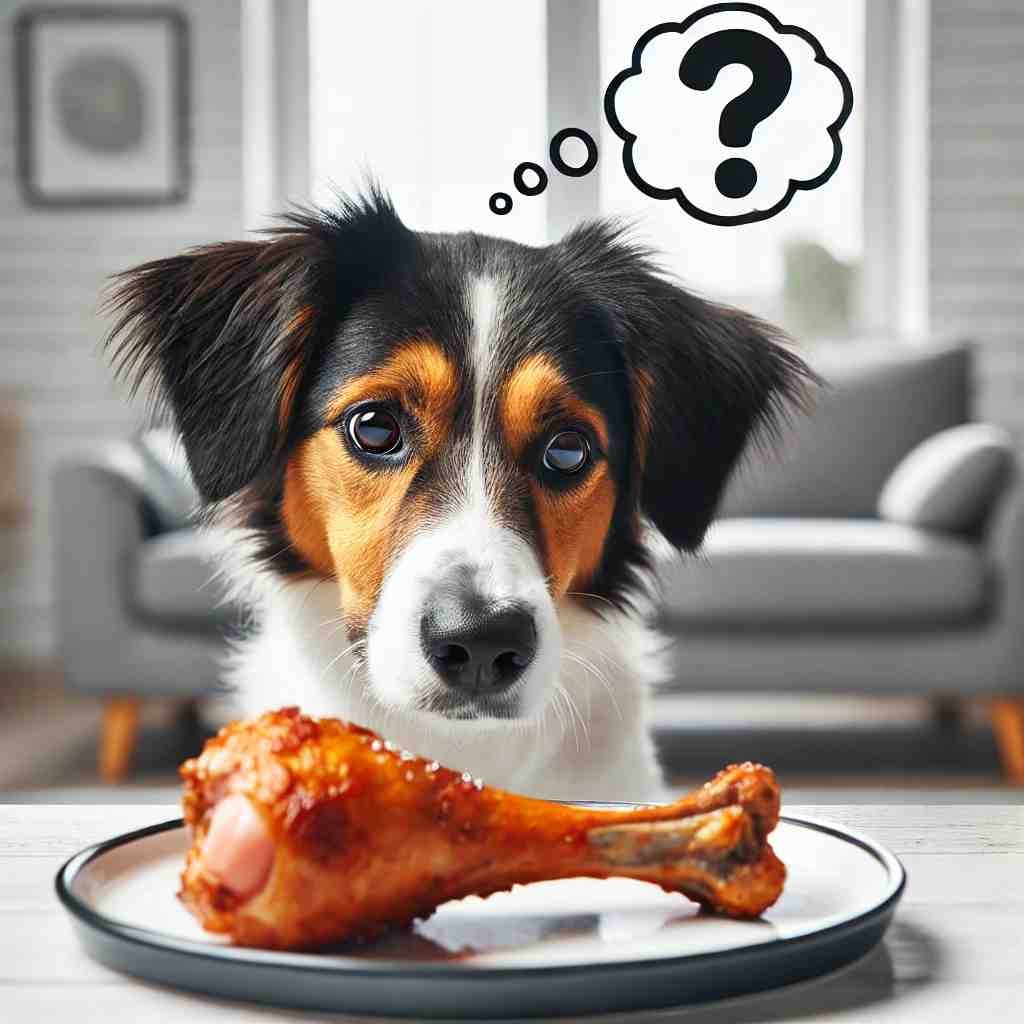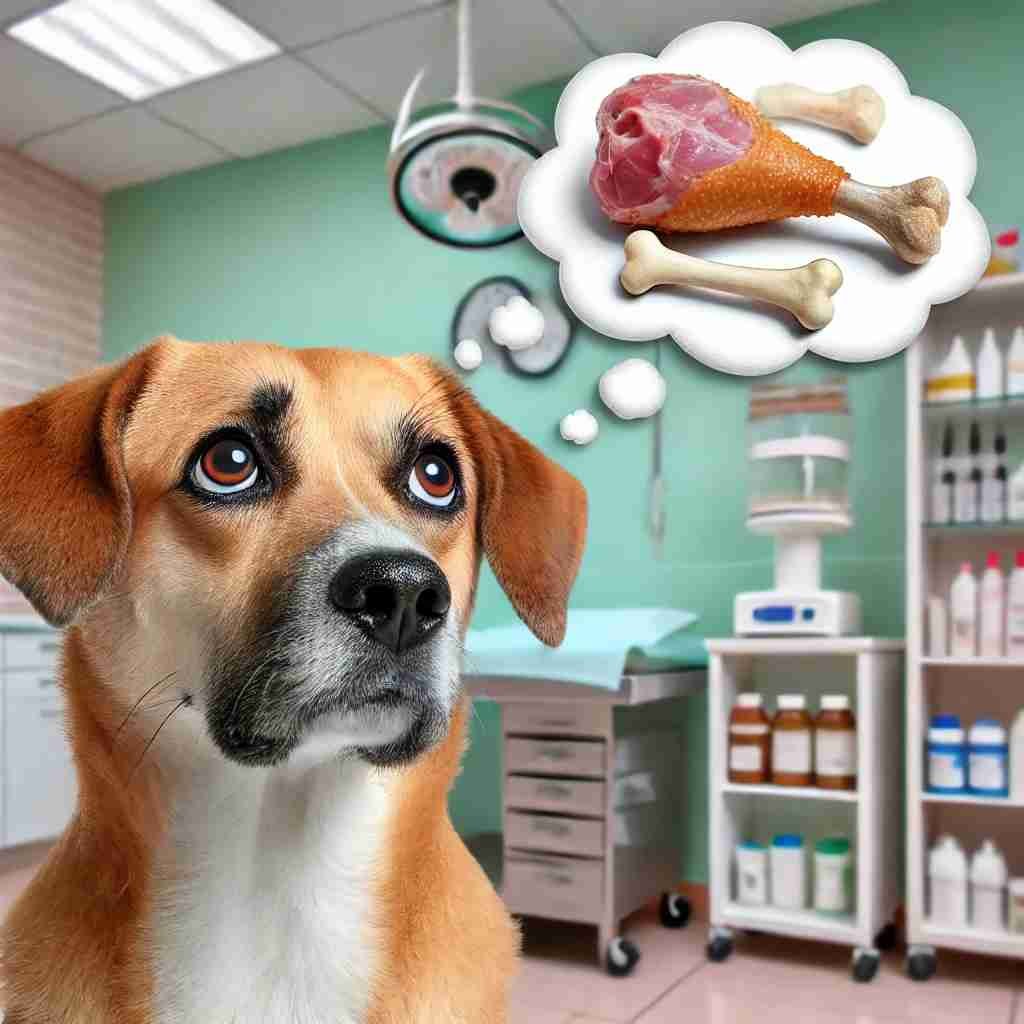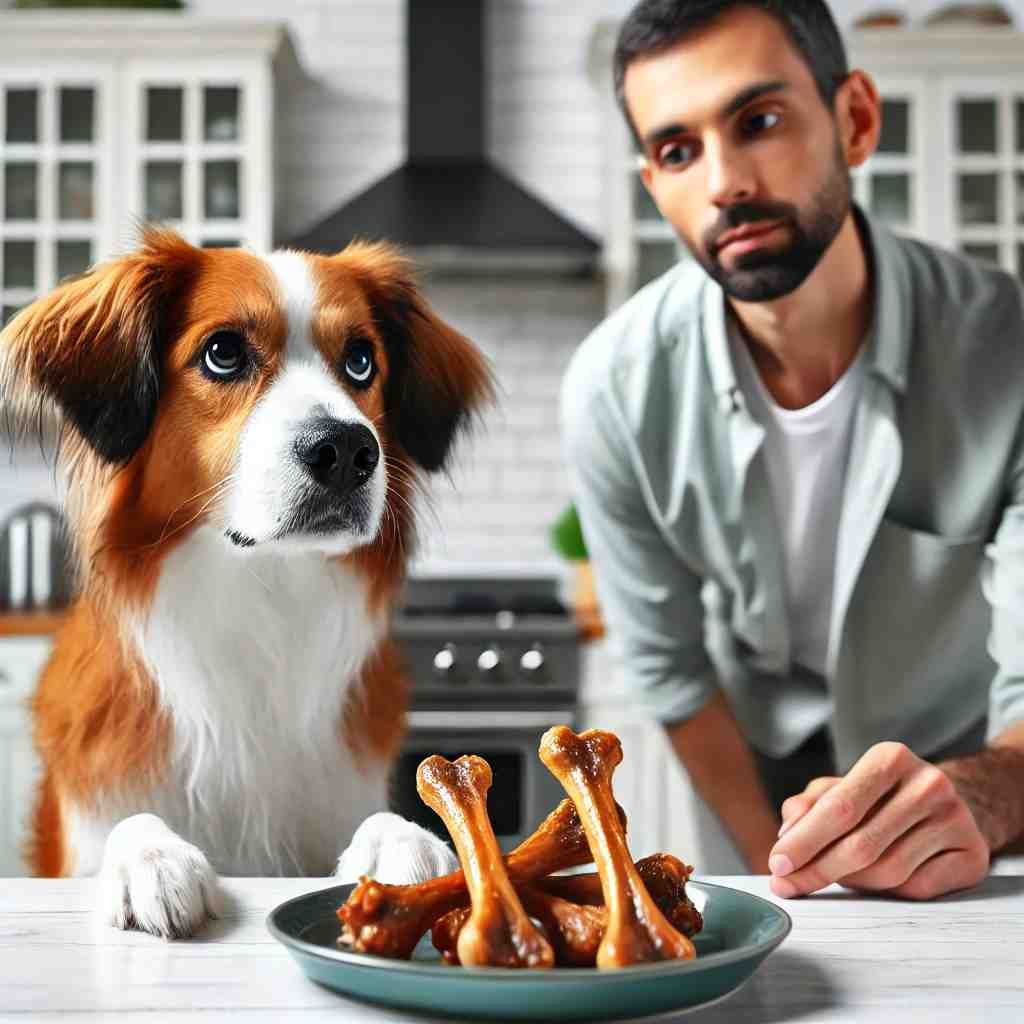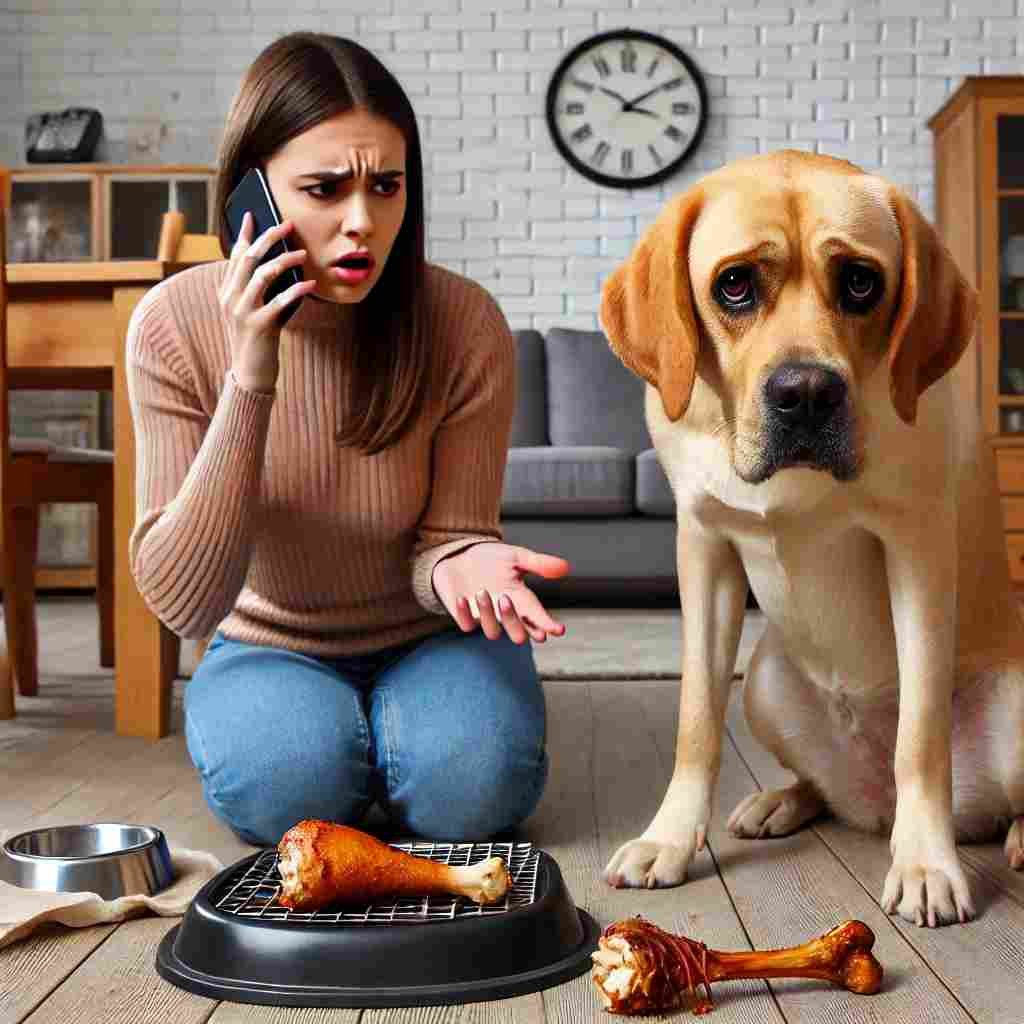No, dogs should not eat raw chicken bones because they can easily get stuck on the roof of the dog’s mouth, causing injury to the oral cavity. Raw chicken meat is also less safe than cooked chicken, which may lead to E. coli or other bacterial infections.
From experience, I once left the kitchen for a minute, only to return and find my roasted chicken from the oven gone, with the potential culprit, my pup, wagging his tail and looking quite pleased with himself. I felt instant panic as I realized he had eaten the bones, forcing me to rush him to the vet immediately.
While some consider raw bones safer than cooked ones, they still pose risks of fracture, splintering, and internal injury when chewed. If your dog eats bones, monitor it closely and always consult your vet to ensure its diet is safe and nutritious.
Can Dogs Eat Chicken Bones?

Dogs have been eating bones for thousands of years, but that doesn’t mean it’s always safe. While chicken bones may dissolve in the stomach and typically pass uneventfully, there is still a chance they can become dangerous.
To keep your dog safe, it’s best to avoid giving them chicken bones, as these can easily splinter and cause internal injuries, blockages, or other serious health issues. Puppies and smaller dogs are particularly vulnerable due to their delicate digestive systems. Instead of risking harm, providing safe chew alternatives that won’t break or splinter is important.
Additionally, keeping your home clean is just as essential when caring for a pet. If you’re wondering how to get dog smell out of wood floors naturally, using a mixture of vinegar and baking soda can help neutralize odors without harsh chemicals. Regular cleaning and proper ventilation will ensure your home stays fresh while keeping your furry friend safe.
Signs Your Dog Swallowed a Chicken Bone

If your dog ate a chicken bone, you might notice several signs of something wrong. Choking, vomiting (with or without blood), or retching and gagging are common symptoms that require immediate attention.
Other signs include drooling, licking lips excessively, abdominal pain, or bloating. If your dog’s breathing becomes labored or they experience diarrhea (with or without blood), this could indicate serious complications.
Watch for tenesmus (straining to defecate), lethargy, or a sudden change in behavior, such as a lack of appetite or even anorexia. These symptoms suggest that the bone might be causing internal problems, and a veterinarian must address them.
What Happens If a Dog Eats Chicken Bones?
Eating chicken bones can lead to dangerous symptoms or even an illness if a dog has eaten chicken bones. Watch closely if your dog is not acting like themselves, which may indicate something serious. A veterinarian or emergency veterinary clinic visit should happen immediately if your pup shows signs like gagging, drooling, or retching.
The vet might perform a physical examination and take an abdomen X-ray to look at the location of the ingested bones and investigate issues like a potential obstruction. Cooked bones, softer than raw bones, can splinter and cause damage.
A thigh bone can get lodged in a dog’s esophagus, causing distress or breathing issues. Splintered bones may tear the GI tract or lead to bacterial contamination, especially if raw. If your dog swallows a bone, seek veterinary help immediately.
Pet owners should also watch for infections affecting digestion. What does giardia poop smell like in dogs? Giardia causes foul-smelling, watery diarrhea, often described as rotten or extra pungent. Consult a vet if you notice this, along with lethargy or weight loss. Keeping your dog’s environment clean and providing fresh water helps prevent infections.
What Happens If a Dog Eats Chicken Bones?
If your dog eats a chicken bone, it’s possible it might not cause harm, but you need to be proactive. Feeding your dog a few slices of plain white bread or soft food immediately after ingestion can help coat the bone and protect against sharp edges.
Keep a close eye on your dog to ensure they don’t develop any signs of illness. Watch for symptoms like choking, vomiting, or diarrhea, which could become life-threatening.
If your pup begins to show symptoms, or if they are a puppy, seek veterinary attention immediately. However, if your dog is still active, eating well, and seems completely normal, it’s generally safe to monitor the situation.
What To Do If Your Dog Chokes on a Chicken Bone?
If you are concerned that a bone is stuck in your dog’s upper airway or intestinal tract, address this emergency immediately. Carefully grasp the bone if visible, but do not stress your pup further.
When the bone is not visible or cannot be safely removed, take your pup to the vet immediately. As a rule, always don’t feed bones to your dog, and never allow your pup access to them, as it helps avoid these dangerous situations.
How To Prevent Your Dog From Eating Chicken Bones

The best way to prevent your dog from getting sick from chicken bones is to keep them out of reach. If your dog tends to steal food while you cook, use a crate or a basket muzzle for safety. These precautions help prevent accidents and protect your dog from sharp bones.
Can Dogs Have Raw Chicken?
No, dogs should not eat raw chicken bones because they can get stuck on the roof of the mouth and cause oral injuries. Although raw chicken meat may seem appealing, it is less safe than cooked meat, as raw bones and meat can lead to E. coli or other bacterial infections.
However, experts consider raw chicken bones safer than cooked bones because dogs find them harder to fracture or splinter when chewing. Still, they can pose risks if accidentally ingested. Cooked bones become brittle and break more easily, often causing severe internal injuries.
Is Raw Chicken Safe for Dogs?
Let’s jump right into it! Yes, raw chicken bones are not completely safe for dogs, but there are a few things to remember when feeding. Always ensure that you supervise feeding, especially if your dog is given a whole bone, as dogs tend to get excited and can quickly chew or tear it apart.
Being present helps avoid any physical problems that may occur, like choking. It’s also important to avoid feeding your pet cooked bones, as cooked chicken bones become brittle and can splinter easily, causing internal damage to the trachea, stomach, or esophagus if a dog ingests small pieces.
Why Cooked Chicken Bones Are Dangerous for Your Dog
Many pet owners think giving chicken bones as a chew is fine, but cooked chicken bones are a major risk. These bones become brittle when chewed, breaking quickly into dangerous splinters. If a dog bites down, the bone splinter can puncture or lacerate the digestive system, leading to internal bleeding or even an abdominal infection.
A punctured GI tract is a serious emergency. Another common issue occurs when a chicken bone gets stuck, blocks digestion, and causes pain. Some dogs even choke if they swallow a chicken bone that lodges in their throat or the bone scrapes and wounds their mouth, tonsils, or rectum during digestion.
Unlike safe rawhide treats or squeaking toys, cooked chicken bones pose real dangers. Even small, broken bones can harm, making filling your dog’s chewing need with safer options crucial.
Why your dog can’t eat raw chicken bones
If your dog ate raw chicken bones, you might think it’s safe, but there are additional risks beyond potential splintering. Although raw bones are more flexible than cooked ones, they still pose dangers, especially if a piece lodges in the system, causing choking or blockages. Another major concern is bacterial and parasitic threats—pathogens like Salmonella can contaminate raw chicken and make your pet sick.
A dog eating raw chicken bones risks developing food poisoning, which can cause vomiting, diarrhea, dehydration, and serious digestive issues. Worse, its feces can spread bacteria to people and family members, especially immunocompromised or at high risk.
Even if a dog seems fine after swallowing a chicken bone, the dangers of contamination and infection make it a common issue that pet owners should take seriously before introducing any new food like raw chicken into their dog’s diet.
What to do if a dog accidentally eats chicken bones

If your dog ate chicken bones, the first step is to stay calm. Don’t panic if your dog isn’t choking or in immediate pain, but monitor its behavior for signs of distress or abdominal discomfort.
Even if your pet eats raw chicken bones, risks remain, especially for puppies or older dogs prone to health problems. If your dog seems fine, a veterinarian may recommend monitoring for a few days, but always call for advice, especially if it swallows a small chicken bone.
Watch for reduced appetite, vomiting, diarrhoea, bathroom problems, blood in the stool, or any general demeanour change.
Pets hide pain, so if your dog is turning down treats or showing changing habits, it could be a sign something is wrong. In such cases, seek medical help immediately.
How can I prevent my dog from eating chicken bones?
Dogs love chewing bones, so providing safe dog bones and chews is the best way to keep them away from chicken bones. A steady supply of dog bones prevents curiosity about leftover chicken wings on the counter.
Always keep chicken bones—whether raw or cooked—out of reach so they don’t tempt your pet. Instead, offer alternative options like dense chews or chew toys designed for pets. The best treats taste great and help keep your dog’s teeth clean, making them excellent options for safe chewing.
FAQS
No, dogs cannot eat chicken bones daily because they become soft and brittle when cooked, making them dangerous. Chewing on these bones may cause them to break or splinter, leading to throat injuries, gastrointestinal damage, or choking hazards. This risk increases when bones are baked or boiled, as they become dry and sharp. Feeding raw bones also comes with risks, so it’s best to avoid them altogether.
Yes, dogs can eat eggs, but they must be fully cooked. Eggs are packed with nutrients and make a healthy supplement to their diet. Some dogs may be allergic or sensitive, so always check for reaction signs after feeding them. Like humans, dogs need safe food, so be sure eggs work well for your pup.
Yes, boiled chicken is a good option to feed your dog, especially when dealing with digestive issues. In fact, many vets recommend it as a common remedy if your pup has vomiting or diarrhea. You can also mix it with rice for a simple, gentle meal. Feeding this helps dogs recover quickly; your vet might suggest it during illness.
Raw chicken bones pose less danger than cooked ones but can still splinter into needle-sharp points. If a dog chews them incorrectly, they may break into small pieces or cause injury. Baked, broiled, or barbecued bones become brittle, dry, and even more likely to splinter, making them unsafe. Most vets warn against giving bones, especially those with sharp angles or cut from tough meat.
Conclusion
While dogs have eaten bones for centuries, chicken bones—whether raw or cooked—pose serious health risks. Cooked bones splinter easily, causing choking, internal injuries, or intestinal obstructions. Raw bones can still cause blockages and bacterial infections.
If your dog eats a chicken bone, watch for distress and contact a vet if needed. Keep chicken bones out of reach and offer safe alternatives like chew toys or vet-approved treats. Always prioritize your pet’s health with a balanced, risk-free diet.

